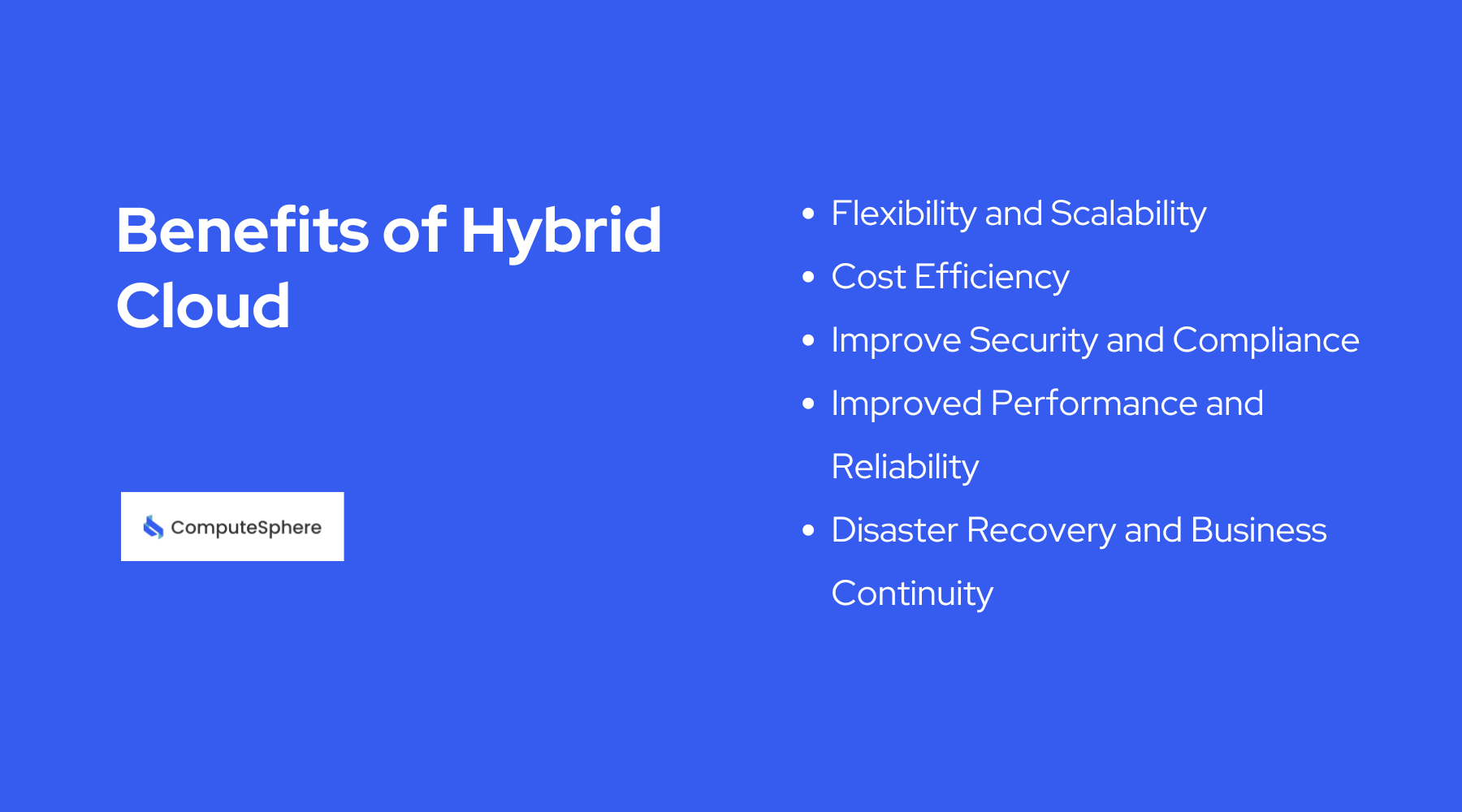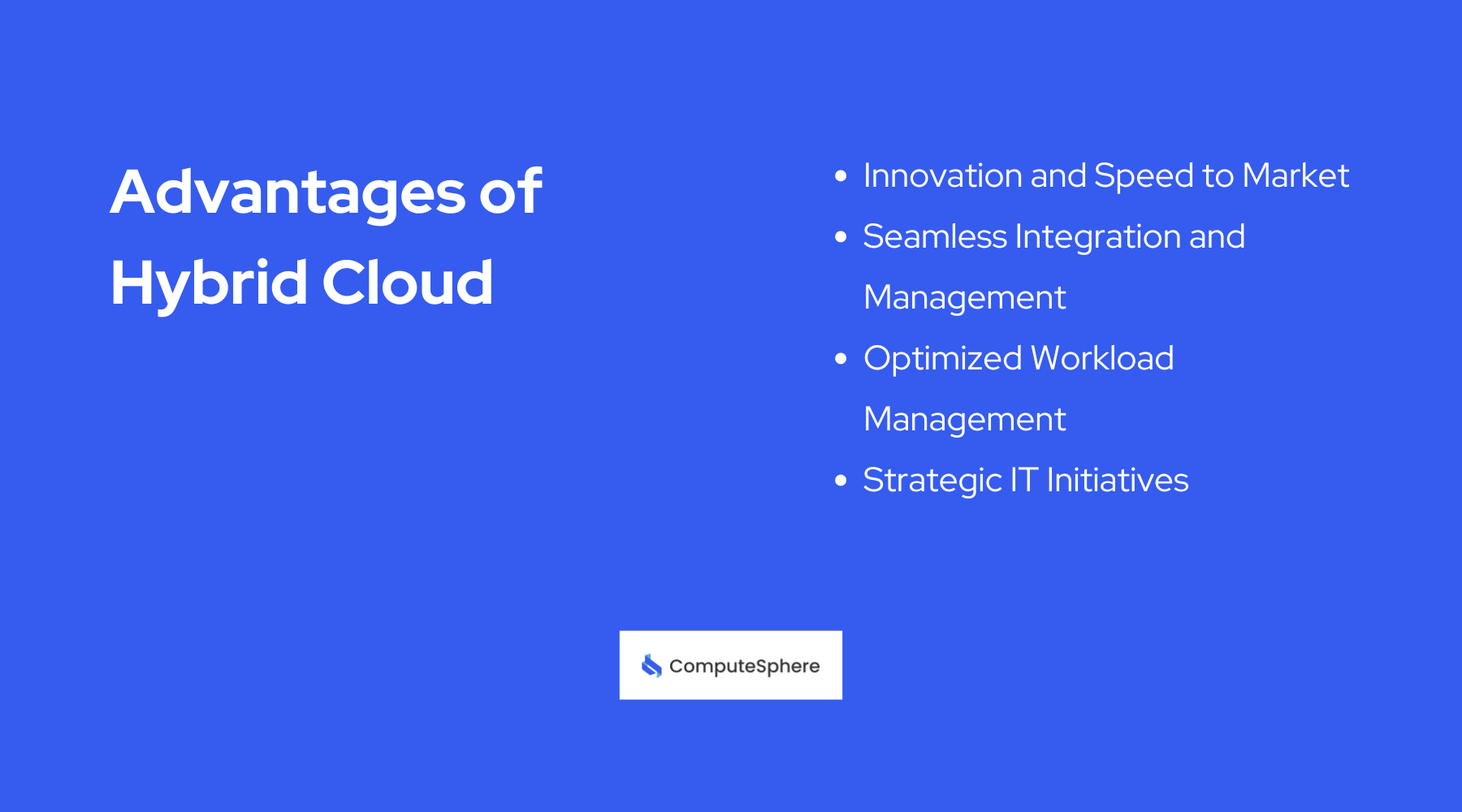Hybrid Cloud: Benefits & Advantages for Modern IT Solutions

Businesses are constantly seeking ways to stay ahead of the competition. One concept that has gained significant popularity is the hybrid cloud. But what exactly is a hybrid cloud, and why are so many companies turning to it? By integrating the strengths of public and private cloud environments, hybrid cloud solutions offer unparalleled flexibility, scalability, and efficiency. This powerful combination allows businesses to optimize their IT infrastructure, manage costs effectively, and improve security measures.
Let's take a look at hybrid clouds and the many benefits they provide.
What is a Hybrid Cloud?
A hybrid cloud is an IT architecture that incorporates a mix of public cloud, private cloud, and on-premises infrastructure. This combination allows businesses to utilize the advantages of multiple environments, customizing their IT resources to specific needs.
At its core, a hybrid cloud integrates and coordinates between public and private clouds, providing a seamless experience for data and application management. Public clouds, such as those offered by Amazon Web Services (AWS), Microsoft Azure, and Google Cloud Platform (GCP), provide scalable and cost-effective solutions for a wide range of applications. Private clouds, on the other hand, offer dedicated resources and improve security, often hosted on-premises or through a private provider.
Benefits of Hybrid Cloud

Flexibility and Scalability
One of the most significant benefits of a hybrid cloud is its flexibility. Businesses can scale their IT resources up or down based on demand. This ensures they can handle peak loads without over-investing in infrastructure. For example, a retail company might experience a surge in traffic during the holiday season. With a hybrid cloud, they can tap into additional resources from the public cloud to manage the increased load, while maintaining their core operations on a private cloud.
Cost Efficiency
Hybrid cloud solutions can lead to substantial cost savings. By optimizing resource usage and employing a pay-as-you-go model for public cloud services, companies can reduce their overall IT expenditures. This approach allows businesses to avoid the significant capital investments required for on-premises infrastructure, while still benefiting from the public cloud’s scalability.
Improve Security and Compliance
Security and compliance are crucial concerns for many businesses. A hybrid cloud offers the best of both worlds by allowing sensitive data to be stored in a private cloud or on-premises, while less sensitive workloads can be managed in the public cloud. This setup helps companies meet regulatory and compliance requirements without compromising on performance or scalability.
Improved Performance and Reliability
Performance and reliability are important in today’s fast-paced business environment. Hybrid clouds can improve performance by distributing workloads across multiple environments, reducing delays, and ensuring critical applications run smoothly. Additionally, the hybrid model provides backup, which improves overall system reliability and minimizes interruptions.
Disaster Recovery and Business Continuity
In the event of a disaster, having a comprehensive recovery plan is essential. Hybrid clouds offer improved disaster recovery options by providing a backup environment in the public cloud. This duplication ensures business continuity, allowing companies to quickly recover and resume operations with minimal disruption.
Advantages of Hybrid Cloud

Innovation and Speed to Market
Hybrid clouds empower businesses to innovate rapidly. By changing cloud-native services, companies can develop and deploy new applications faster than ever before. This agility enables businesses to respond to market changes and customer demands more efficiently, gaining a competitive edge.
Seamless Integration and Management
Integrating a hybrid cloud with existing IT infrastructure can be done seamlessly. Centralized management tools provide a unified view of the entire IT environment, simplifying administration and monitoring. This integration allows businesses to manage resources effectively, ensuring optimal performance and utilization.
Optimized Workload Management
Different workloads have different requirements. Hybrid clouds enable businesses to run each workload in the most suitable environment. For example, traditional applications can continue to run on-premises, while modern, cloud-native applications can take advantage of the scalability and flexibility of the public cloud. This approach ensures efficient workload management and maximizes resource utilization.
Strategic IT Initiatives
Hybrid cloud Support strategic IT initiatives is another significant advantage of hybrid clouds. Whether it’s digital transformation, big data analytics, artificial intelligence, or the Internet of Things (IoT), hybrid clouds provide the necessary infrastructure and tools to drive these initiatives forward. By changing hybrid cloud solutions, businesses can stay at the frontline of technological advancements and achieve their strategic goals.
Use Cases of Hybrid Cloud
Enterprise Applications: Enterprise applications such as ERP and CRM systems can benefit greatly from hybrid cloud environments. By running these applications in a hybrid setup, businesses can ensure high availability, scalability, and performance while maintaining control over sensitive data.
Data and Analytics: Data and analytics workloads often require significant processing power and storage. Hybrid clouds allow businesses to utilize public cloud resources for data storage and processing while keeping sensitive data on-premises or in a private cloud. This setup provides the flexibility to handle large data sets and complex analytics tasks efficiently.
Application Development and Testing: Hybrid clouds are ideal for application development and testing. Developers can use the public cloud for development and testing environments, taking advantage of its scalability and cost-effectiveness. Once the applications are ready, they can be deployed in the most suitable environment, whether it’s on-premises, private cloud, or public cloud.
Seasonal and Peak Demand Management: Many businesses experience seasonal spikes in demand. Hybrid clouds allow companies to manage these peaks effectively by utilizing public cloud resources during high-demand periods. This approach ensures consistent performance and availability without the need for significant investments in permanent infrastructure.
Conclusion
The hybrid cloud represents a significant evolution in IT architecture, offering numerous benefits and advantages that address the diverse needs of modern businesses. Its flexibility, cost efficiency, improved security, and improved performance make it an attractive option for organizations looking to optimize their IT operations.
As businesses continue to navigate the complexities of the digital age, hybrid cloud solutions provide the necessary infrastructure to drive innovation. It ensures business continuity and supports strategic initiatives. By adopting a hybrid cloud strategy, companies can position themselves for long-term success. This changes the best of both public and private cloud environments.
Contents
Built for Builders. Priced for Startups.
Tired of unpredictable cloud bills? ComputeSphere offers modular, fixed-cost cloud hosting that grows with your startup—no DevOps headaches, no surprises.
Get StartedShare this article
Browse Some Related Blogs
Relevant and related contents you can read









